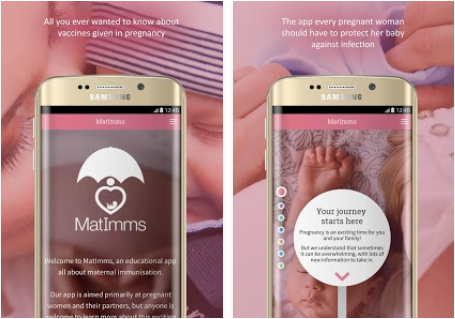Maternal Immunisations (MatImms) App

"When women were surveyed about what would help them to make an informed decision about taking up the recommended vaccines during their pregnancies, the consensus was that the information given to them was not sufficient and many had suggested that a net-based information tool would be more useful than leaflets."
Released in April 2016, the MatImms smartphone application is designed to guide pregnant women by providing information about infections that could be harmful to them and their baby, such as flu and whooping cough, and which could be prevented by getting vaccinated in pregnancy. Researchers and clinicians from Imperial College London and Imperial College Healthcare National [United Kingdom, or UK] Health Services (NHS) Trust teamed up to develop the free app, with input from pregnant women, after becoming concerned about the low uptake of certain vaccines amongst pregnant women, as they have concerns regarding safety or do not have sufficient information. For example, whooping cough is the most common cause of death in babies from a vaccine-preventable disease in the UK, and an outbreak in 2011-12 resulted in the deaths of 14 infants. However, a survey of 200 pregnant women in London between 2013 and 2014 revealed that over one-third were not even aware they could have a whooping cough vaccination, and only 26% had actually been vaccinated.
In an effort to bridge the communication gap and foster informed choices about vaccines, the app provides parents with information about the vaccination programme during pregnancy and immunisation in early childhood in the UK. It includes a personalised vaccination schedule based on the woman's due date, which can be synced to her phone's calendar, with reminders about when to get her own vaccines and when to vaccinate her baby during the first year of life.
The app provides different levels of information about vaccines in general and takes the user on a journey by explaining specifically how women in pregnancy can protect their babies through vaccinations. It explains the concept of protection through maternal antibodies and the general function of the immune system and the placenta. The app also tackles concerns about vaccinations with information on their ingredients and safety records, and it contains links and videos to other websites for further information.
The team who developed MatImms will conduct a further study on whether the app is useful to pregnant women and helps inform their decisions around taking up vaccination during pregnancy.
For more information on MatImms and the rationale behind its development, see:
- "New App Advises and Reminds Pregnant Women about Vaccinations", by Maxine Myers, March 11 2016; and
- "Pregnancy Vaccine for Whooping Cough Used by Just One in Four London Women", by Kate Wighton, November 23 2015.
Publishers
eHealthNews.edu, accessed May 27 2016; and email from Beate Kampmann to The Communication Initiative on June 3 2016.
- Log in to post comments
